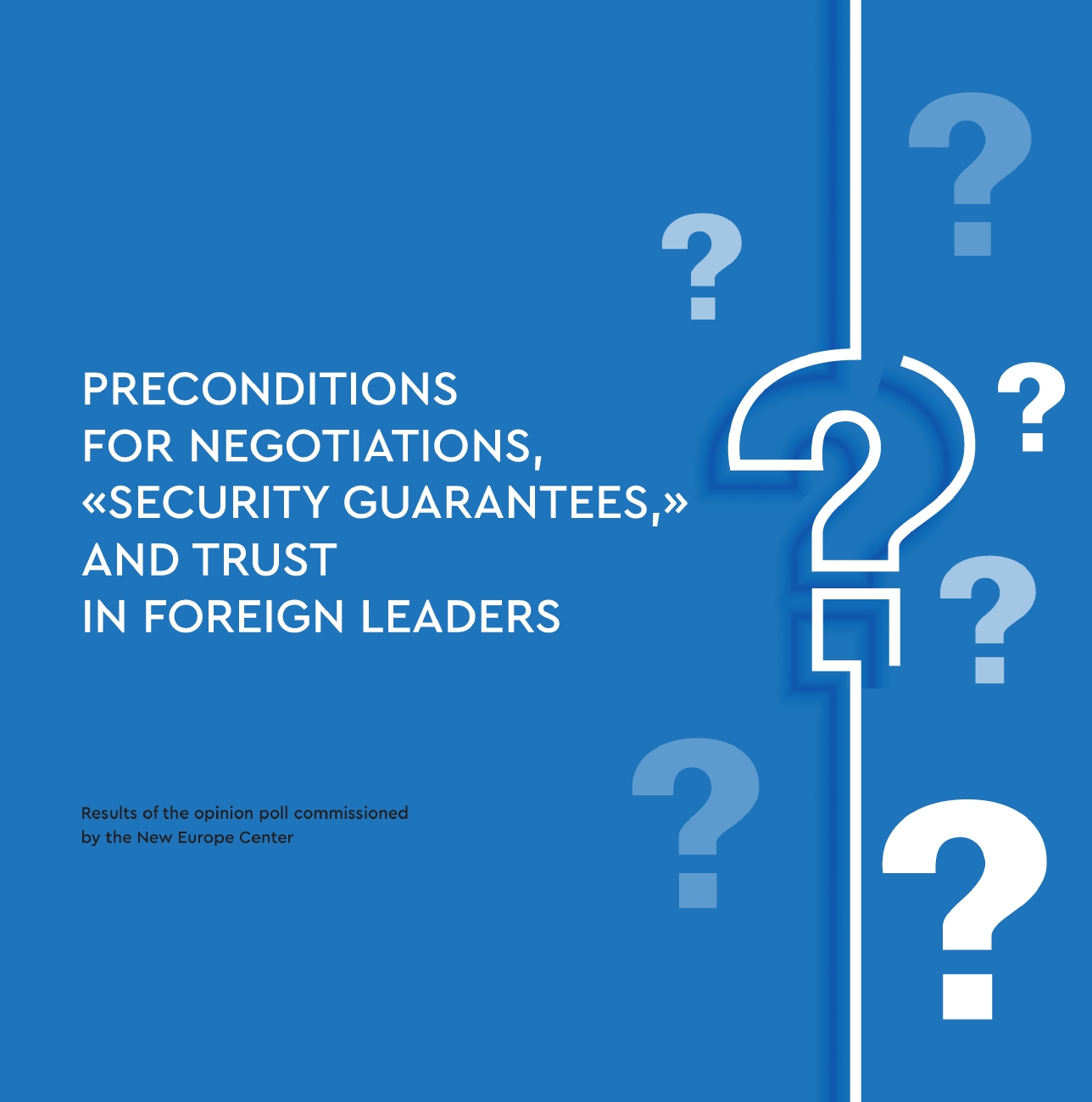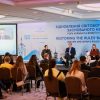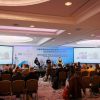
Сommissioned by the New Europe Center INFO SAPIENS conducted the study, in which the opinions of Ukrainians regarding security issues, in particular:
- What do you consider the best “security guarantee” for Ukraine?
- Should Ukraine provide assistance to the United States and Taiwan in the event of a Chinese attack on Taiwan?
- Among foreign leaders, who inspires the greatest trust in you?
- Under what circumstances should Ukraine engage in negotiations with Russia?
- In peaceful negotiations with Russia, what actions do you consider acceptable?
- Who could negotiate with Russia on behalf of Ukraine to end the war?
- What are your thoughts when you hear representatives of the EU and the USA addressing corruption in Ukraine?
- What are your expectations for the NATO Summit in Washington scheduled for July 2024?
Read the results of the survey via the following link.
- “Security Guarantees”. Ukrainian attitudes are scattered regarding what “security guarantees” would best ensure Ukraine’s security before full NATO membership. The most popular option is the approach that involves the country’s integration into NATO (with the understanding that the Alliance’s protection extends only to the controlled territory). 32.6% of Ukrainians support this option. The dispersion of responses may indicate both that Ukrainians are not very well informed about the details of the security guarantees discussion and that citizens do not see an effective alternative to the full membership of the country in NATO. As known, recent opinion polls consistently show a high level of public support for Ukraine’s membership in the Alliance (at around 80%).
- Ukraine should support Taiwan. The majority of Ukrainians believe that Ukraine must provide assistance to the United States and Taiwan in the event of a Chinese attack on Taiwan. This view is shared by practically half of the respondents, at 47.1%. The option ‘We need to prioritize our own security’ was supported by 39.5% of those surveyed. To some extent, this may indicate a high level of understanding in Ukraine of the interdependence of global processes: democracies should support each other in resisting the encroachments of authoritarian, aggressive states. This could also be seen as a manifestation of gratitude for the support Ukraine currently receives from the United States.
- Biden is number one, surpassing Duda. This year, the champion of public trust in Ukraine among foreign leaders is U.S. President Joseph Biden (81.8%). The high level of enthusiasm for American leadership and the United States, in general, is quite indicative, contrasting with the criticism that can be heard in Ukraine regarding the key partner and the ‘as long as it takes’ strategy. Maintaining a high level of trust in Biden occurs against the backdrop of controversies in the U.S. Congress over allocating funds for Ukraine, blocking the country’s NATO accession process, slow progress, and insufficient volumes of arms supply.
Andrzej Duda, who held the top position in our opinion polls for several years, has somewhat slipped in the rankings, though he continues to be among the leaders (but this time in second place with a score of 77.7% – last year it was 86.8%). Apparently, elements of tension in Ukrainian-Polish relations could not go unnoticed in Ukrainians’ attitudes towards the leadership of the neighboring state.
- Europeans are gaining sympathy. A year ago, our opinion poll showed a relatively low level of trust in the leaders of France and Germany, especially when compared to the presidents of the USA or Poland. Currently, this indicator has increased for both Emmanuel Macron and Olaf Scholz. The German Chancellor is now trusted by 61.4% of Ukrainians, compared to 49.2% before, and the French President by 54.5%, compared to 43.9%. Symbolically, the trio of leaders in public sympathy, excluding the presidents of the USA and Poland, includes the President of the European Commission, Ursula von der Leyen. This may indicate a high level of trust in European institutions overall.
- Leaders of distrust. The top three heads of states whom Ukrainians distrust the most probably won’t come as a surprise to anyone: Vladimir Putin, Alexander Lukashenko, and Xi Jinping. The fourth position is occupied by the Hungarian Prime Minister Viktor Orban. The level of distrust toward Turkish President Recep Tayyip Erdoğan has increased by almost 10%.
- There is no basis for negotiations. Respondents believe that Ukraine can engage in talks with Russia only if Moscow decides to withdraw its troops from Ukrainian territory (34.8%). Third of those participating in the opinion poll chose the option “under no circumstances”.
- No concessions to the aggressor. We proposed to assess the acceptability of concessions in possible negotiations. Ukrainians are quite categorical in this regard – the majority of respondents deemed almost all proposed options in the opinion poll as entirely unacceptable: temporarily giving up the reclamation of occupied territories (76.2%); abandoning NATO membership (56.9%); reducing the Ukrainian army (83.2%); granting state status to the Russian language (73%); renouncing EU membership (61%); reducing reparations from Russia (66.8%); and waiving criminal prosecution of Russian leaders and war criminals (77%).
- Negotiations on behalf of Ukraine will be conducted solely by Ukraine. The overwhelming majority of Ukrainians believe that only Ukraine can participate in potential negotiations with Russia (71.7%). No other country can fulfill this role on behalf of Ukraine. Only 14.2% of Ukrainians believe that the United States could assume such a role, and 5% mention the European Union.
- Criticism from abroad regarding corruption? Welcome. Ukrainians have a positive attitude towards critical statements from the EU and the USA that highlight issues with corruption in our country. The majority of respondents (70.4%) believe that the EU and the USA are doing the right thing, as Ukraine needs such external pressure to overcome corruption.
- What are the anticipated outcomes of the upcoming NATO summit? Ukrainian opinions diverge regarding the expectations for the Washington NATO Summit scheduled for July 2024. One-third of respondents express no expectations whatsoever. Discounting these 30% of skeptics, the next most prevalent anticipation is an invitation for Ukraine to join NATO and the commencement of the accession process (25%). Nearly 20% foresee Ukraine achieving full membership in NATO. An invitation without the initiation of the accession process is the preference of 10%. When aggregating the total number of expectations foreseeing various levels of progress in Ukraine’s integration into the Alliance, it reaches 65%.
The opinion poll was conducted with the support of the International Renaissance Foundation and the EU. The conclusions of the material reflect the position of the authors and do not necessarily coincide with the position of the International Renaissance Foundation and the EU.







